Organize Meeting: Types, Obligations, Communication, and Effectiveness
VerifiedAdded on 2020/05/28
|12
|2359
|520
Report
AI Summary
This report comprehensively examines the multifaceted aspects of organizing effective meetings. It begins by identifying various meeting types, including status updates, information sharing, decision-making, problem-solving, and team-building meetings. The report then delves into the legal and ethical requirements that govern meetings, such as workplace health and safety, non-discrimination, and confidentiality, emphasizing the importance of adhering to these obligations for a successful and productive meeting environment. It further explores ethical considerations like maintaining integrity and promoting teamwork. The report also discusses cultural factors, communication techniques to ensure participation, and the differences between formal, informal, and semi-formal meetings. Additionally, it examines the role of draft agendas, the format of meeting minutes, and the advantages and disadvantages of digital tools like Google Drive and Skype. Finally, it offers insights into ensuring timely distribution of meeting minutes and the importance of hard copies of meeting documents.
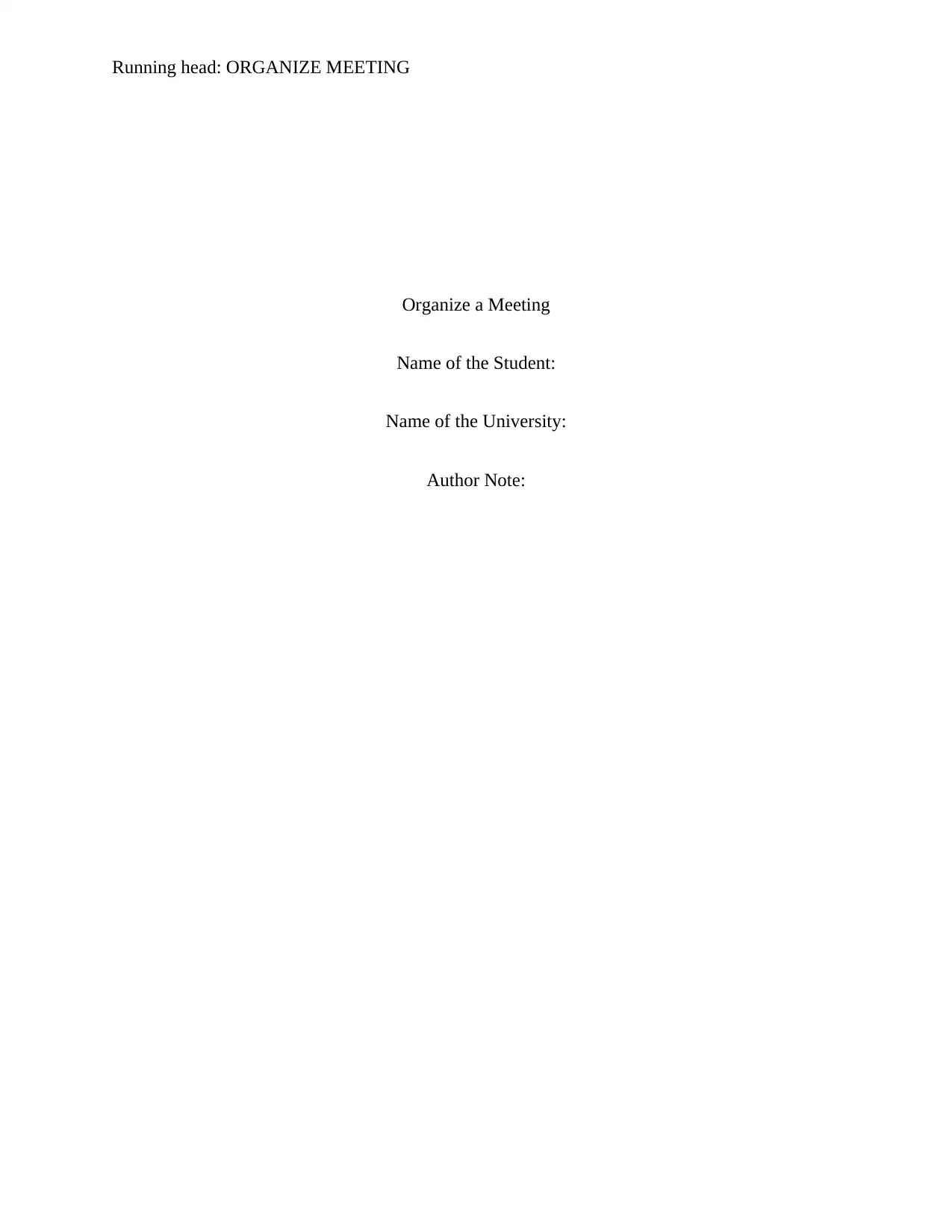
Running head: ORGANIZE MEETING
Organize a Meeting
Name of the Student:
Name of the University:
Author Note:
Organize a Meeting
Name of the Student:
Name of the University:
Author Note:
Paraphrase This Document
Need a fresh take? Get an instant paraphrase of this document with our AI Paraphraser
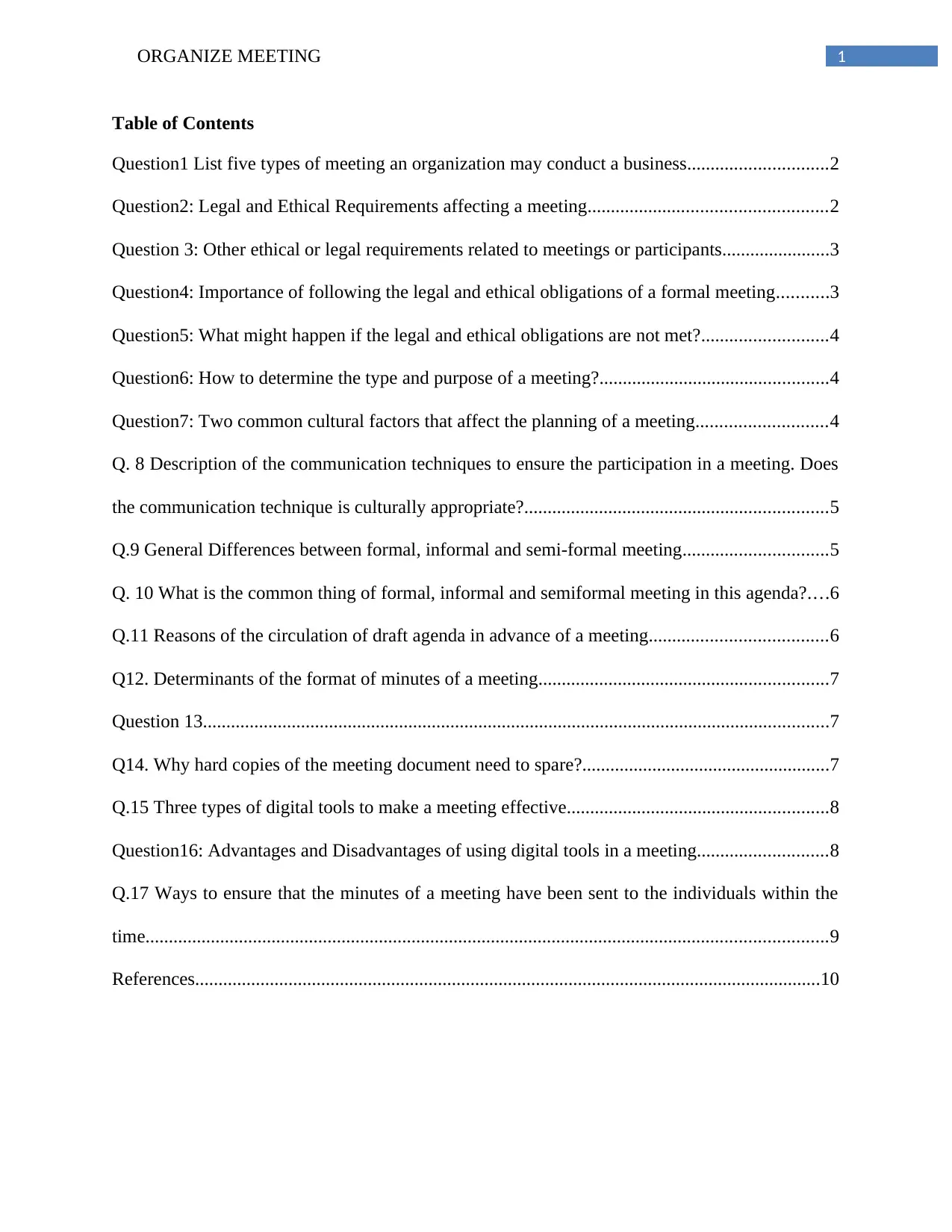
1ORGANIZE MEETING
Table of Contents
Question1 List five types of meeting an organization may conduct a business..............................2
Question2: Legal and Ethical Requirements affecting a meeting...................................................2
Question 3: Other ethical or legal requirements related to meetings or participants.......................3
Question4: Importance of following the legal and ethical obligations of a formal meeting...........3
Question5: What might happen if the legal and ethical obligations are not met?...........................4
Question6: How to determine the type and purpose of a meeting?.................................................4
Question7: Two common cultural factors that affect the planning of a meeting............................4
Q. 8 Description of the communication techniques to ensure the participation in a meeting. Does
the communication technique is culturally appropriate?.................................................................5
Q.9 General Differences between formal, informal and semi-formal meeting...............................5
Q. 10 What is the common thing of formal, informal and semiformal meeting in this agenda?....6
Q.11 Reasons of the circulation of draft agenda in advance of a meeting......................................6
Q12. Determinants of the format of minutes of a meeting..............................................................7
Question 13......................................................................................................................................7
Q14. Why hard copies of the meeting document need to spare?.....................................................7
Q.15 Three types of digital tools to make a meeting effective........................................................8
Question16: Advantages and Disadvantages of using digital tools in a meeting............................8
Q.17 Ways to ensure that the minutes of a meeting have been sent to the individuals within the
time..................................................................................................................................................9
References......................................................................................................................................10
Table of Contents
Question1 List five types of meeting an organization may conduct a business..............................2
Question2: Legal and Ethical Requirements affecting a meeting...................................................2
Question 3: Other ethical or legal requirements related to meetings or participants.......................3
Question4: Importance of following the legal and ethical obligations of a formal meeting...........3
Question5: What might happen if the legal and ethical obligations are not met?...........................4
Question6: How to determine the type and purpose of a meeting?.................................................4
Question7: Two common cultural factors that affect the planning of a meeting............................4
Q. 8 Description of the communication techniques to ensure the participation in a meeting. Does
the communication technique is culturally appropriate?.................................................................5
Q.9 General Differences between formal, informal and semi-formal meeting...............................5
Q. 10 What is the common thing of formal, informal and semiformal meeting in this agenda?....6
Q.11 Reasons of the circulation of draft agenda in advance of a meeting......................................6
Q12. Determinants of the format of minutes of a meeting..............................................................7
Question 13......................................................................................................................................7
Q14. Why hard copies of the meeting document need to spare?.....................................................7
Q.15 Three types of digital tools to make a meeting effective........................................................8
Question16: Advantages and Disadvantages of using digital tools in a meeting............................8
Q.17 Ways to ensure that the minutes of a meeting have been sent to the individuals within the
time..................................................................................................................................................9
References......................................................................................................................................10
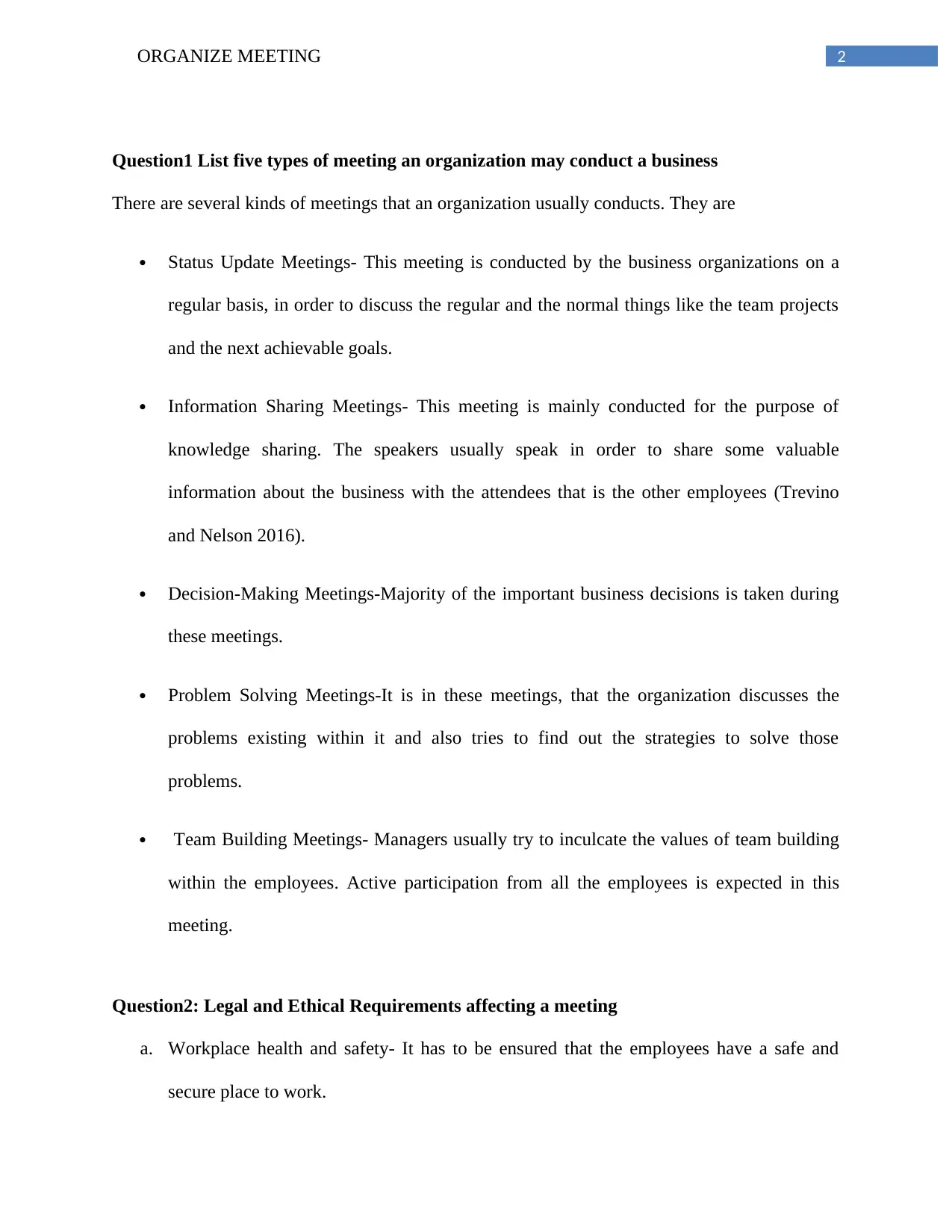
2ORGANIZE MEETING
Question1 List five types of meeting an organization may conduct a business
There are several kinds of meetings that an organization usually conducts. They are
Status Update Meetings- This meeting is conducted by the business organizations on a
regular basis, in order to discuss the regular and the normal things like the team projects
and the next achievable goals.
Information Sharing Meetings- This meeting is mainly conducted for the purpose of
knowledge sharing. The speakers usually speak in order to share some valuable
information about the business with the attendees that is the other employees (Trevino
and Nelson 2016).
Decision-Making Meetings-Majority of the important business decisions is taken during
these meetings.
Problem Solving Meetings-It is in these meetings, that the organization discusses the
problems existing within it and also tries to find out the strategies to solve those
problems.
Team Building Meetings- Managers usually try to inculcate the values of team building
within the employees. Active participation from all the employees is expected in this
meeting.
Question2: Legal and Ethical Requirements affecting a meeting
a. Workplace health and safety- It has to be ensured that the employees have a safe and
secure place to work.
Question1 List five types of meeting an organization may conduct a business
There are several kinds of meetings that an organization usually conducts. They are
Status Update Meetings- This meeting is conducted by the business organizations on a
regular basis, in order to discuss the regular and the normal things like the team projects
and the next achievable goals.
Information Sharing Meetings- This meeting is mainly conducted for the purpose of
knowledge sharing. The speakers usually speak in order to share some valuable
information about the business with the attendees that is the other employees (Trevino
and Nelson 2016).
Decision-Making Meetings-Majority of the important business decisions is taken during
these meetings.
Problem Solving Meetings-It is in these meetings, that the organization discusses the
problems existing within it and also tries to find out the strategies to solve those
problems.
Team Building Meetings- Managers usually try to inculcate the values of team building
within the employees. Active participation from all the employees is expected in this
meeting.
Question2: Legal and Ethical Requirements affecting a meeting
a. Workplace health and safety- It has to be ensured that the employees have a safe and
secure place to work.
⊘ This is a preview!⊘
Do you want full access?
Subscribe today to unlock all pages.

Trusted by 1+ million students worldwide
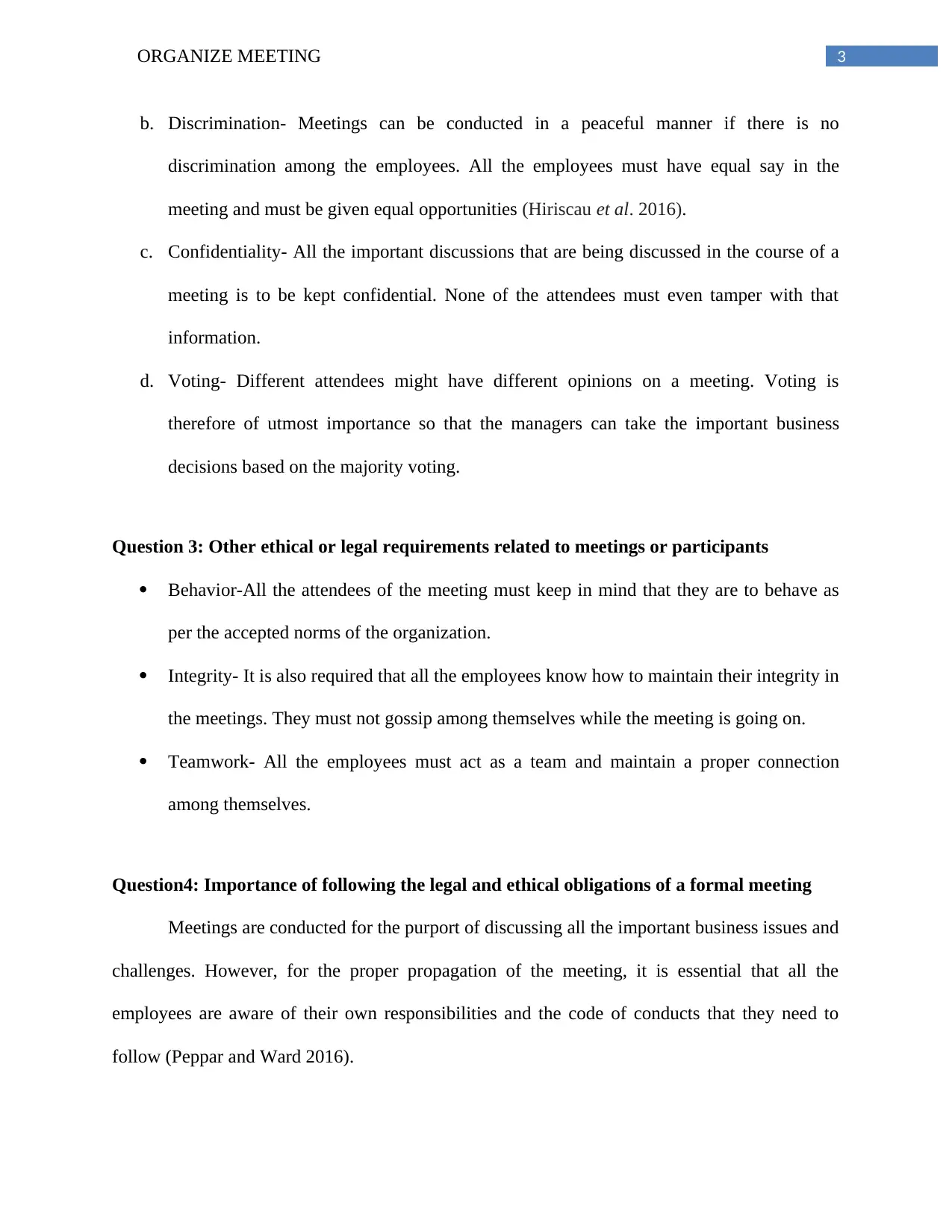
3ORGANIZE MEETING
b. Discrimination- Meetings can be conducted in a peaceful manner if there is no
discrimination among the employees. All the employees must have equal say in the
meeting and must be given equal opportunities (Hiriscau et al. 2016).
c. Confidentiality- All the important discussions that are being discussed in the course of a
meeting is to be kept confidential. None of the attendees must even tamper with that
information.
d. Voting- Different attendees might have different opinions on a meeting. Voting is
therefore of utmost importance so that the managers can take the important business
decisions based on the majority voting.
Question 3: Other ethical or legal requirements related to meetings or participants
Behavior-All the attendees of the meeting must keep in mind that they are to behave as
per the accepted norms of the organization.
Integrity- It is also required that all the employees know how to maintain their integrity in
the meetings. They must not gossip among themselves while the meeting is going on.
Teamwork- All the employees must act as a team and maintain a proper connection
among themselves.
Question4: Importance of following the legal and ethical obligations of a formal meeting
Meetings are conducted for the purport of discussing all the important business issues and
challenges. However, for the proper propagation of the meeting, it is essential that all the
employees are aware of their own responsibilities and the code of conducts that they need to
follow (Peppar and Ward 2016).
b. Discrimination- Meetings can be conducted in a peaceful manner if there is no
discrimination among the employees. All the employees must have equal say in the
meeting and must be given equal opportunities (Hiriscau et al. 2016).
c. Confidentiality- All the important discussions that are being discussed in the course of a
meeting is to be kept confidential. None of the attendees must even tamper with that
information.
d. Voting- Different attendees might have different opinions on a meeting. Voting is
therefore of utmost importance so that the managers can take the important business
decisions based on the majority voting.
Question 3: Other ethical or legal requirements related to meetings or participants
Behavior-All the attendees of the meeting must keep in mind that they are to behave as
per the accepted norms of the organization.
Integrity- It is also required that all the employees know how to maintain their integrity in
the meetings. They must not gossip among themselves while the meeting is going on.
Teamwork- All the employees must act as a team and maintain a proper connection
among themselves.
Question4: Importance of following the legal and ethical obligations of a formal meeting
Meetings are conducted for the purport of discussing all the important business issues and
challenges. However, for the proper propagation of the meeting, it is essential that all the
employees are aware of their own responsibilities and the code of conducts that they need to
follow (Peppar and Ward 2016).
Paraphrase This Document
Need a fresh take? Get an instant paraphrase of this document with our AI Paraphraser
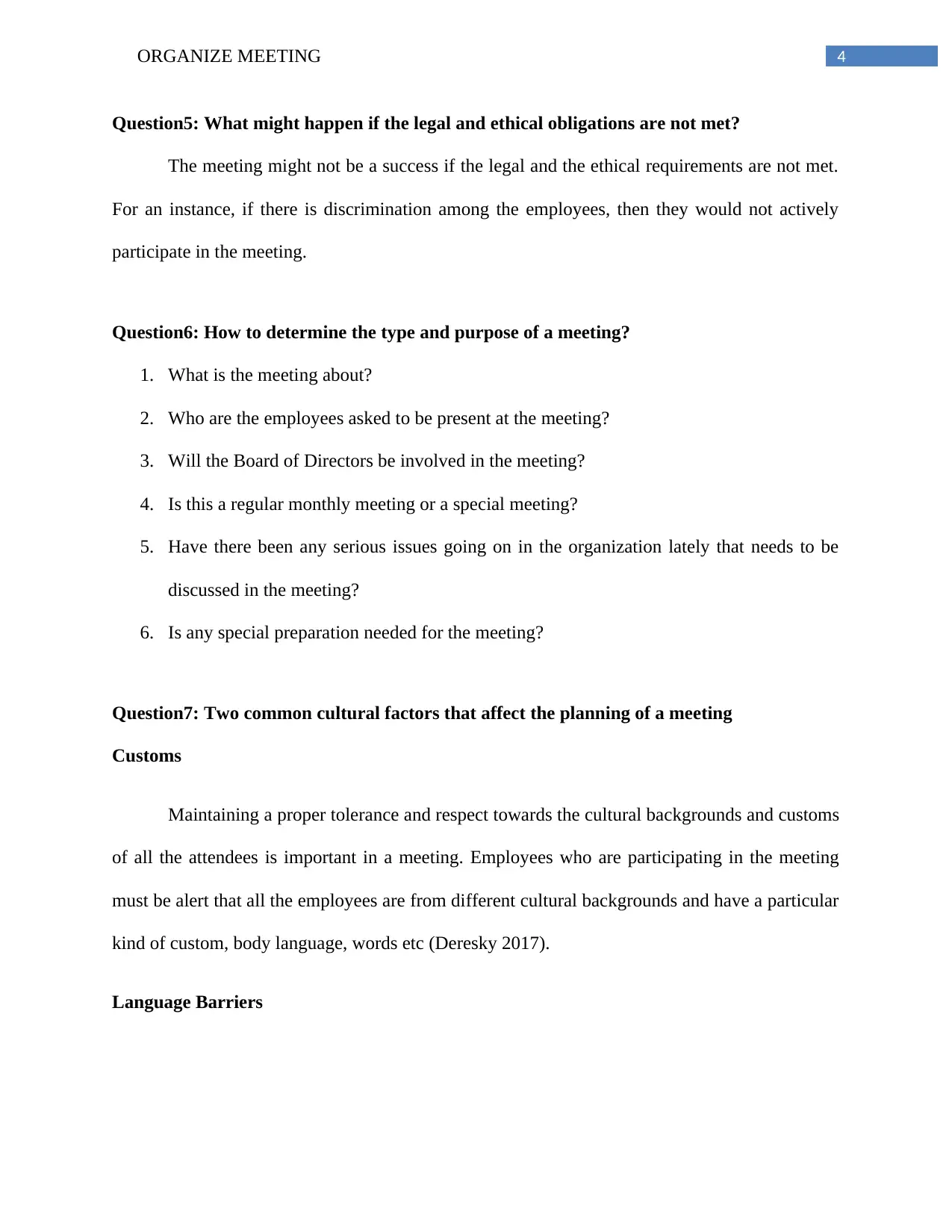
4ORGANIZE MEETING
Question5: What might happen if the legal and ethical obligations are not met?
The meeting might not be a success if the legal and the ethical requirements are not met.
For an instance, if there is discrimination among the employees, then they would not actively
participate in the meeting.
Question6: How to determine the type and purpose of a meeting?
1. What is the meeting about?
2. Who are the employees asked to be present at the meeting?
3. Will the Board of Directors be involved in the meeting?
4. Is this a regular monthly meeting or a special meeting?
5. Have there been any serious issues going on in the organization lately that needs to be
discussed in the meeting?
6. Is any special preparation needed for the meeting?
Question7: Two common cultural factors that affect the planning of a meeting
Customs
Maintaining a proper tolerance and respect towards the cultural backgrounds and customs
of all the attendees is important in a meeting. Employees who are participating in the meeting
must be alert that all the employees are from different cultural backgrounds and have a particular
kind of custom, body language, words etc (Deresky 2017).
Language Barriers
Question5: What might happen if the legal and ethical obligations are not met?
The meeting might not be a success if the legal and the ethical requirements are not met.
For an instance, if there is discrimination among the employees, then they would not actively
participate in the meeting.
Question6: How to determine the type and purpose of a meeting?
1. What is the meeting about?
2. Who are the employees asked to be present at the meeting?
3. Will the Board of Directors be involved in the meeting?
4. Is this a regular monthly meeting or a special meeting?
5. Have there been any serious issues going on in the organization lately that needs to be
discussed in the meeting?
6. Is any special preparation needed for the meeting?
Question7: Two common cultural factors that affect the planning of a meeting
Customs
Maintaining a proper tolerance and respect towards the cultural backgrounds and customs
of all the attendees is important in a meeting. Employees who are participating in the meeting
must be alert that all the employees are from different cultural backgrounds and have a particular
kind of custom, body language, words etc (Deresky 2017).
Language Barriers
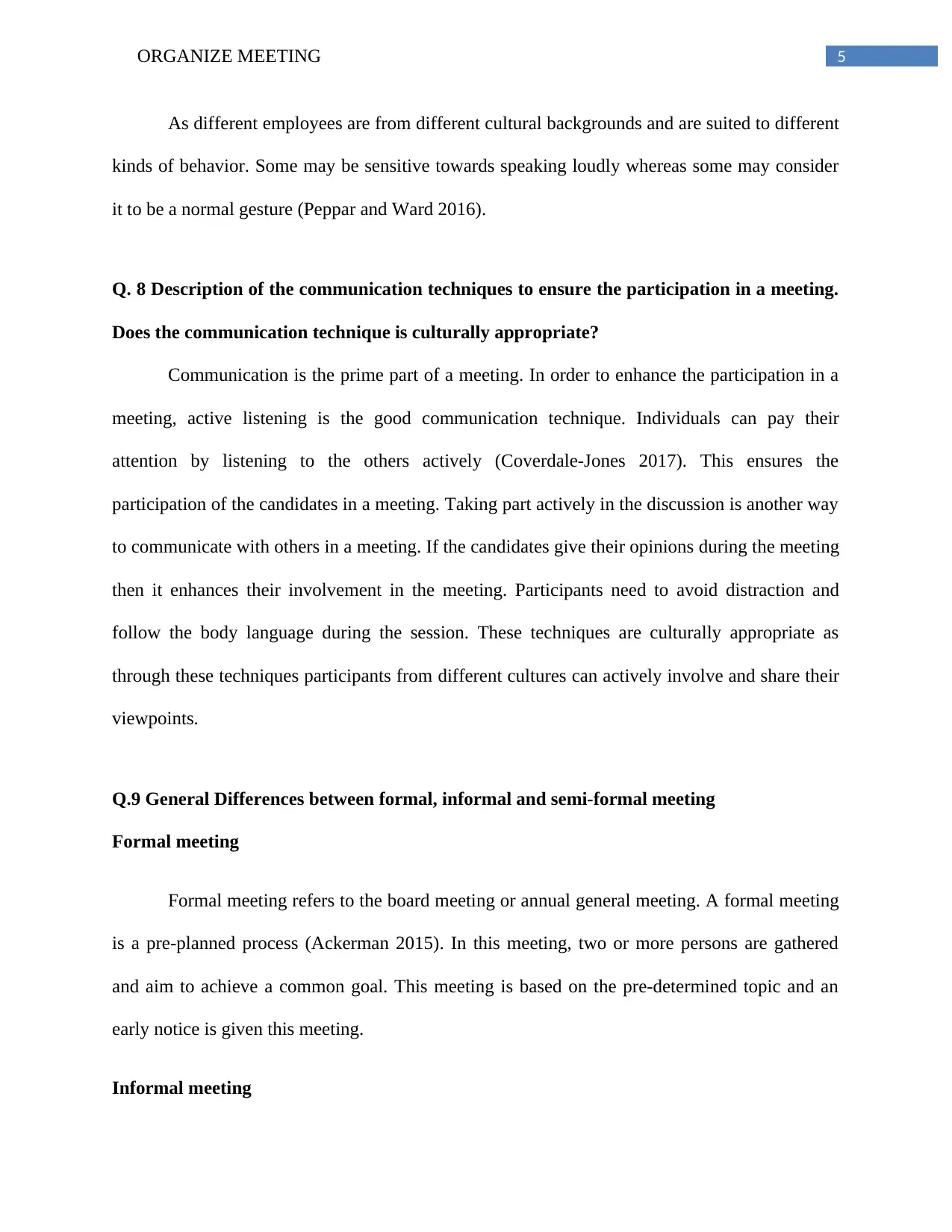
5ORGANIZE MEETING
As different employees are from different cultural backgrounds and are suited to different
kinds of behavior. Some may be sensitive towards speaking loudly whereas some may consider
it to be a normal gesture (Peppar and Ward 2016).
Q. 8 Description of the communication techniques to ensure the participation in a meeting.
Does the communication technique is culturally appropriate?
Communication is the prime part of a meeting. In order to enhance the participation in a
meeting, active listening is the good communication technique. Individuals can pay their
attention by listening to the others actively (Coverdale-Jones 2017). This ensures the
participation of the candidates in a meeting. Taking part actively in the discussion is another way
to communicate with others in a meeting. If the candidates give their opinions during the meeting
then it enhances their involvement in the meeting. Participants need to avoid distraction and
follow the body language during the session. These techniques are culturally appropriate as
through these techniques participants from different cultures can actively involve and share their
viewpoints.
Q.9 General Differences between formal, informal and semi-formal meeting
Formal meeting
Formal meeting refers to the board meeting or annual general meeting. A formal meeting
is a pre-planned process (Ackerman 2015). In this meeting, two or more persons are gathered
and aim to achieve a common goal. This meeting is based on the pre-determined topic and an
early notice is given this meeting.
Informal meeting
As different employees are from different cultural backgrounds and are suited to different
kinds of behavior. Some may be sensitive towards speaking loudly whereas some may consider
it to be a normal gesture (Peppar and Ward 2016).
Q. 8 Description of the communication techniques to ensure the participation in a meeting.
Does the communication technique is culturally appropriate?
Communication is the prime part of a meeting. In order to enhance the participation in a
meeting, active listening is the good communication technique. Individuals can pay their
attention by listening to the others actively (Coverdale-Jones 2017). This ensures the
participation of the candidates in a meeting. Taking part actively in the discussion is another way
to communicate with others in a meeting. If the candidates give their opinions during the meeting
then it enhances their involvement in the meeting. Participants need to avoid distraction and
follow the body language during the session. These techniques are culturally appropriate as
through these techniques participants from different cultures can actively involve and share their
viewpoints.
Q.9 General Differences between formal, informal and semi-formal meeting
Formal meeting
Formal meeting refers to the board meeting or annual general meeting. A formal meeting
is a pre-planned process (Ackerman 2015). In this meeting, two or more persons are gathered
and aim to achieve a common goal. This meeting is based on the pre-determined topic and an
early notice is given this meeting.
Informal meeting
⊘ This is a preview!⊘
Do you want full access?
Subscribe today to unlock all pages.

Trusted by 1+ million students worldwide
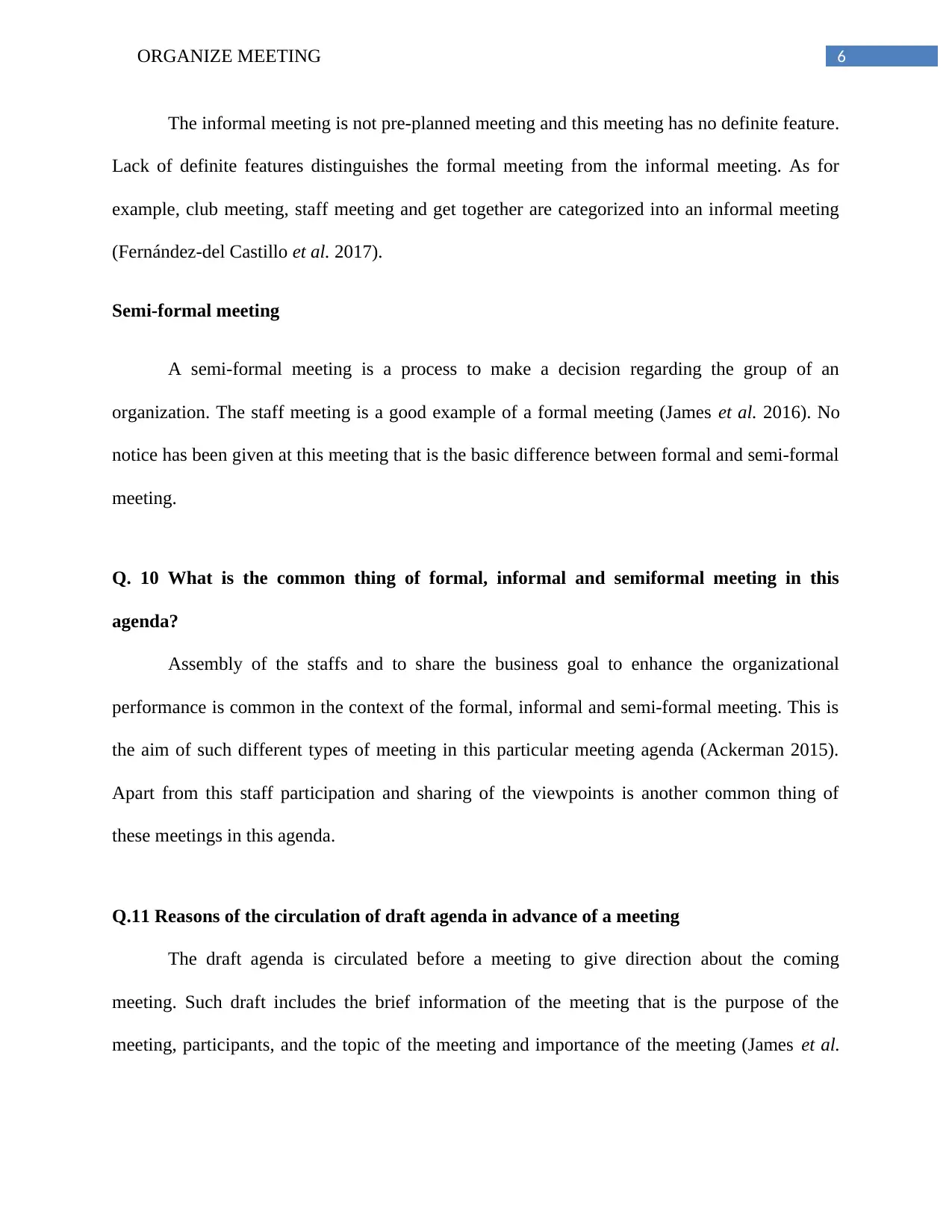
6ORGANIZE MEETING
The informal meeting is not pre-planned meeting and this meeting has no definite feature.
Lack of definite features distinguishes the formal meeting from the informal meeting. As for
example, club meeting, staff meeting and get together are categorized into an informal meeting
(Fernández-del Castillo et al. 2017).
Semi-formal meeting
A semi-formal meeting is a process to make a decision regarding the group of an
organization. The staff meeting is a good example of a formal meeting (James et al. 2016). No
notice has been given at this meeting that is the basic difference between formal and semi-formal
meeting.
Q. 10 What is the common thing of formal, informal and semiformal meeting in this
agenda?
Assembly of the staffs and to share the business goal to enhance the organizational
performance is common in the context of the formal, informal and semi-formal meeting. This is
the aim of such different types of meeting in this particular meeting agenda (Ackerman 2015).
Apart from this staff participation and sharing of the viewpoints is another common thing of
these meetings in this agenda.
Q.11 Reasons of the circulation of draft agenda in advance of a meeting
The draft agenda is circulated before a meeting to give direction about the coming
meeting. Such draft includes the brief information of the meeting that is the purpose of the
meeting, participants, and the topic of the meeting and importance of the meeting (James et al.
The informal meeting is not pre-planned meeting and this meeting has no definite feature.
Lack of definite features distinguishes the formal meeting from the informal meeting. As for
example, club meeting, staff meeting and get together are categorized into an informal meeting
(Fernández-del Castillo et al. 2017).
Semi-formal meeting
A semi-formal meeting is a process to make a decision regarding the group of an
organization. The staff meeting is a good example of a formal meeting (James et al. 2016). No
notice has been given at this meeting that is the basic difference between formal and semi-formal
meeting.
Q. 10 What is the common thing of formal, informal and semiformal meeting in this
agenda?
Assembly of the staffs and to share the business goal to enhance the organizational
performance is common in the context of the formal, informal and semi-formal meeting. This is
the aim of such different types of meeting in this particular meeting agenda (Ackerman 2015).
Apart from this staff participation and sharing of the viewpoints is another common thing of
these meetings in this agenda.
Q.11 Reasons of the circulation of draft agenda in advance of a meeting
The draft agenda is circulated before a meeting to give direction about the coming
meeting. Such draft includes the brief information of the meeting that is the purpose of the
meeting, participants, and the topic of the meeting and importance of the meeting (James et al.
Paraphrase This Document
Need a fresh take? Get an instant paraphrase of this document with our AI Paraphraser
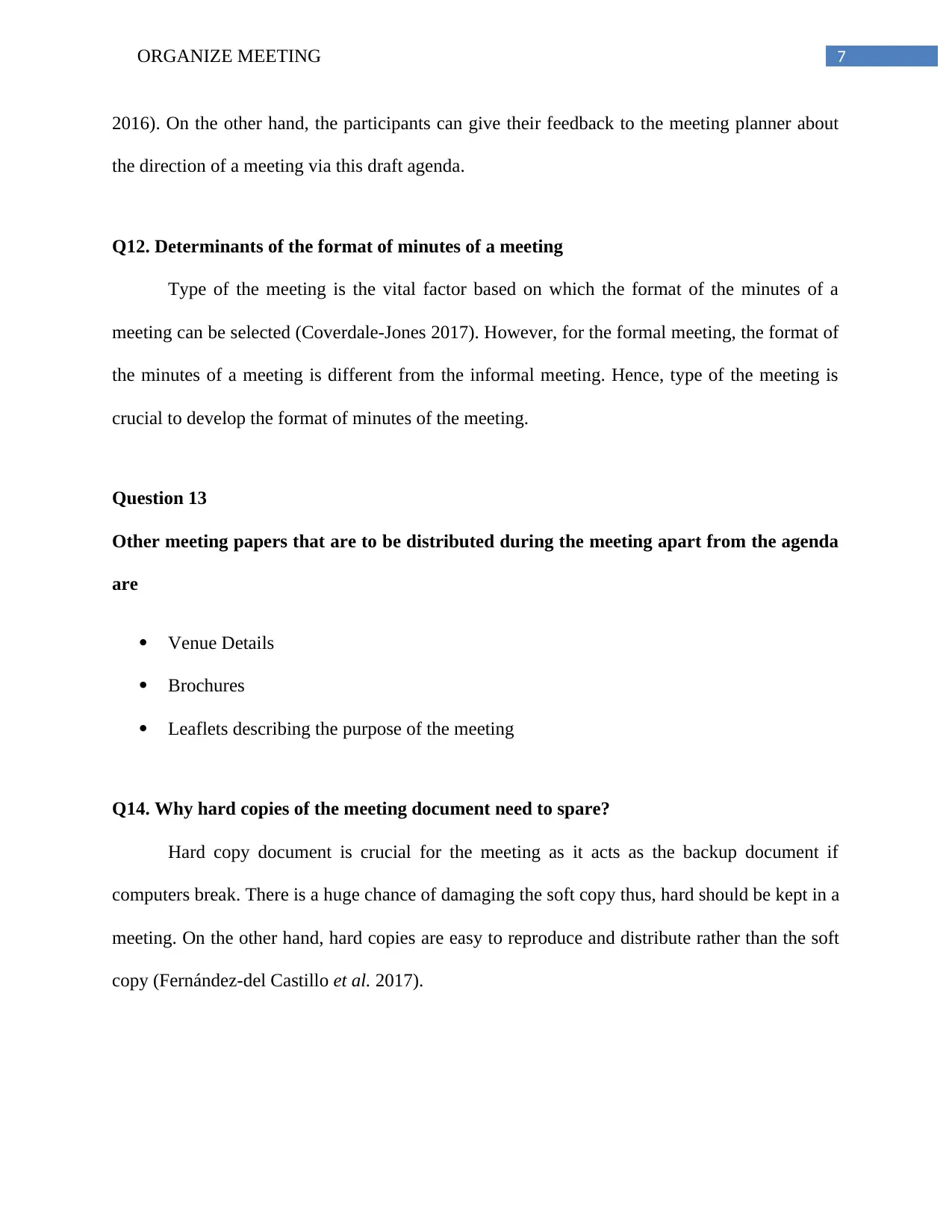
7ORGANIZE MEETING
2016). On the other hand, the participants can give their feedback to the meeting planner about
the direction of a meeting via this draft agenda.
Q12. Determinants of the format of minutes of a meeting
Type of the meeting is the vital factor based on which the format of the minutes of a
meeting can be selected (Coverdale-Jones 2017). However, for the formal meeting, the format of
the minutes of a meeting is different from the informal meeting. Hence, type of the meeting is
crucial to develop the format of minutes of the meeting.
Question 13
Other meeting papers that are to be distributed during the meeting apart from the agenda
are
Venue Details
Brochures
Leaflets describing the purpose of the meeting
Q14. Why hard copies of the meeting document need to spare?
Hard copy document is crucial for the meeting as it acts as the backup document if
computers break. There is a huge chance of damaging the soft copy thus, hard should be kept in a
meeting. On the other hand, hard copies are easy to reproduce and distribute rather than the soft
copy (Fernández-del Castillo et al. 2017).
2016). On the other hand, the participants can give their feedback to the meeting planner about
the direction of a meeting via this draft agenda.
Q12. Determinants of the format of minutes of a meeting
Type of the meeting is the vital factor based on which the format of the minutes of a
meeting can be selected (Coverdale-Jones 2017). However, for the formal meeting, the format of
the minutes of a meeting is different from the informal meeting. Hence, type of the meeting is
crucial to develop the format of minutes of the meeting.
Question 13
Other meeting papers that are to be distributed during the meeting apart from the agenda
are
Venue Details
Brochures
Leaflets describing the purpose of the meeting
Q14. Why hard copies of the meeting document need to spare?
Hard copy document is crucial for the meeting as it acts as the backup document if
computers break. There is a huge chance of damaging the soft copy thus, hard should be kept in a
meeting. On the other hand, hard copies are easy to reproduce and distribute rather than the soft
copy (Fernández-del Castillo et al. 2017).
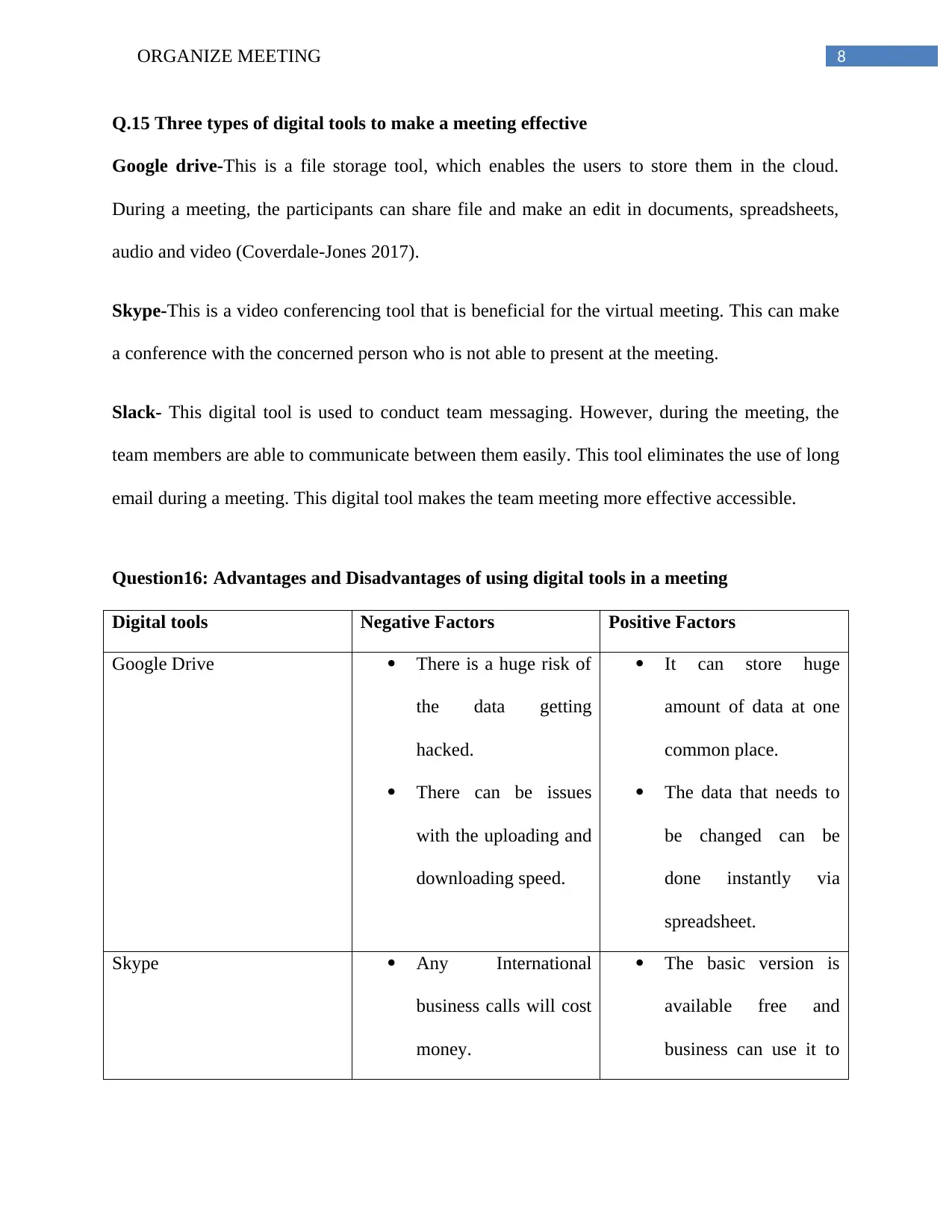
8ORGANIZE MEETING
Q.15 Three types of digital tools to make a meeting effective
Google drive-This is a file storage tool, which enables the users to store them in the cloud.
During a meeting, the participants can share file and make an edit in documents, spreadsheets,
audio and video (Coverdale-Jones 2017).
Skype-This is a video conferencing tool that is beneficial for the virtual meeting. This can make
a conference with the concerned person who is not able to present at the meeting.
Slack- This digital tool is used to conduct team messaging. However, during the meeting, the
team members are able to communicate between them easily. This tool eliminates the use of long
email during a meeting. This digital tool makes the team meeting more effective accessible.
Question16: Advantages and Disadvantages of using digital tools in a meeting
Digital tools Negative Factors Positive Factors
Google Drive There is a huge risk of
the data getting
hacked.
There can be issues
with the uploading and
downloading speed.
It can store huge
amount of data at one
common place.
The data that needs to
be changed can be
done instantly via
spreadsheet.
Skype Any International
business calls will cost
money.
The basic version is
available free and
business can use it to
Q.15 Three types of digital tools to make a meeting effective
Google drive-This is a file storage tool, which enables the users to store them in the cloud.
During a meeting, the participants can share file and make an edit in documents, spreadsheets,
audio and video (Coverdale-Jones 2017).
Skype-This is a video conferencing tool that is beneficial for the virtual meeting. This can make
a conference with the concerned person who is not able to present at the meeting.
Slack- This digital tool is used to conduct team messaging. However, during the meeting, the
team members are able to communicate between them easily. This tool eliminates the use of long
email during a meeting. This digital tool makes the team meeting more effective accessible.
Question16: Advantages and Disadvantages of using digital tools in a meeting
Digital tools Negative Factors Positive Factors
Google Drive There is a huge risk of
the data getting
hacked.
There can be issues
with the uploading and
downloading speed.
It can store huge
amount of data at one
common place.
The data that needs to
be changed can be
done instantly via
spreadsheet.
Skype Any International
business calls will cost
money.
The basic version is
available free and
business can use it to
⊘ This is a preview!⊘
Do you want full access?
Subscribe today to unlock all pages.

Trusted by 1+ million students worldwide
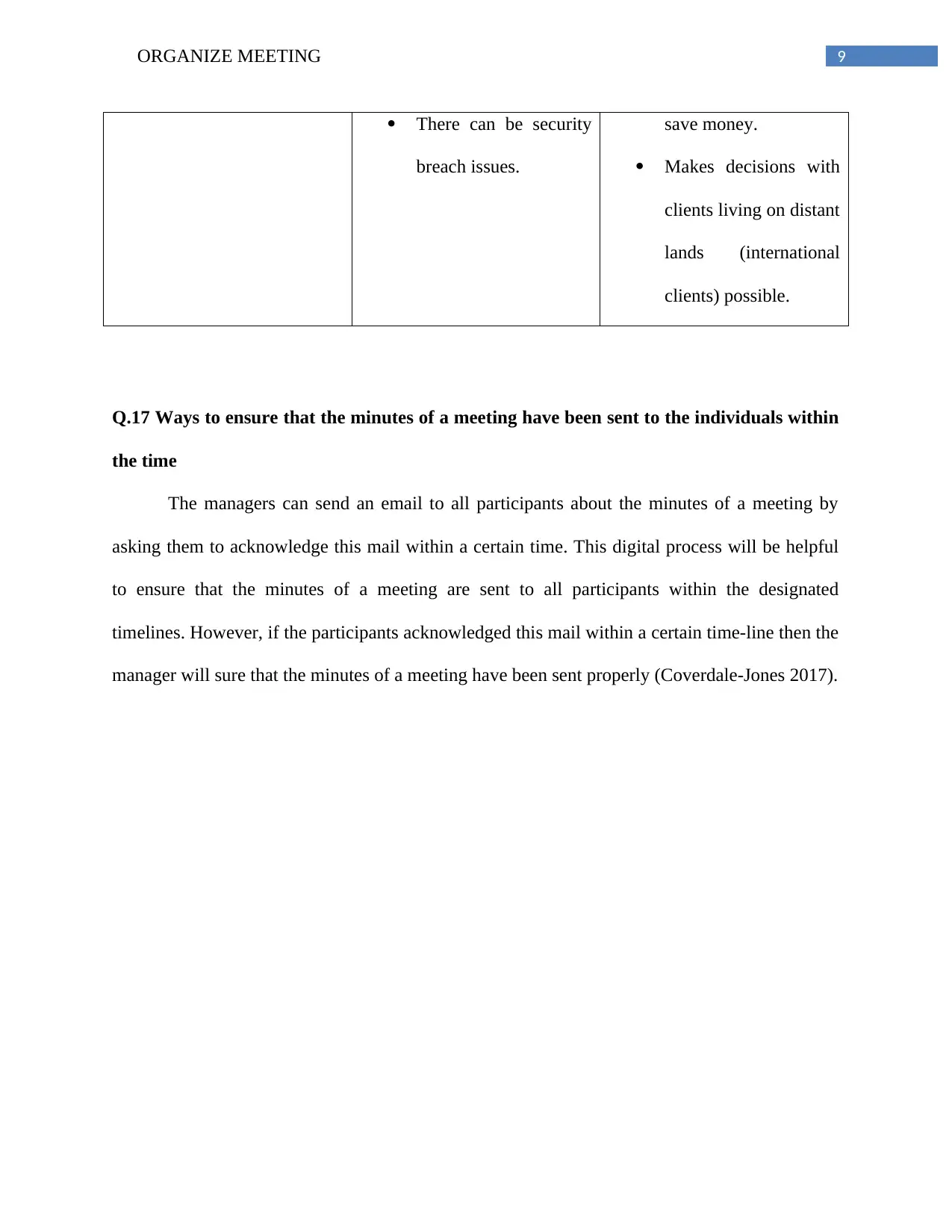
9ORGANIZE MEETING
There can be security
breach issues.
save money.
Makes decisions with
clients living on distant
lands (international
clients) possible.
Q.17 Ways to ensure that the minutes of a meeting have been sent to the individuals within
the time
The managers can send an email to all participants about the minutes of a meeting by
asking them to acknowledge this mail within a certain time. This digital process will be helpful
to ensure that the minutes of a meeting are sent to all participants within the designated
timelines. However, if the participants acknowledged this mail within a certain time-line then the
manager will sure that the minutes of a meeting have been sent properly (Coverdale-Jones 2017).
There can be security
breach issues.
save money.
Makes decisions with
clients living on distant
lands (international
clients) possible.
Q.17 Ways to ensure that the minutes of a meeting have been sent to the individuals within
the time
The managers can send an email to all participants about the minutes of a meeting by
asking them to acknowledge this mail within a certain time. This digital process will be helpful
to ensure that the minutes of a meeting are sent to all participants within the designated
timelines. However, if the participants acknowledged this mail within a certain time-line then the
manager will sure that the minutes of a meeting have been sent properly (Coverdale-Jones 2017).
Paraphrase This Document
Need a fresh take? Get an instant paraphrase of this document with our AI Paraphraser
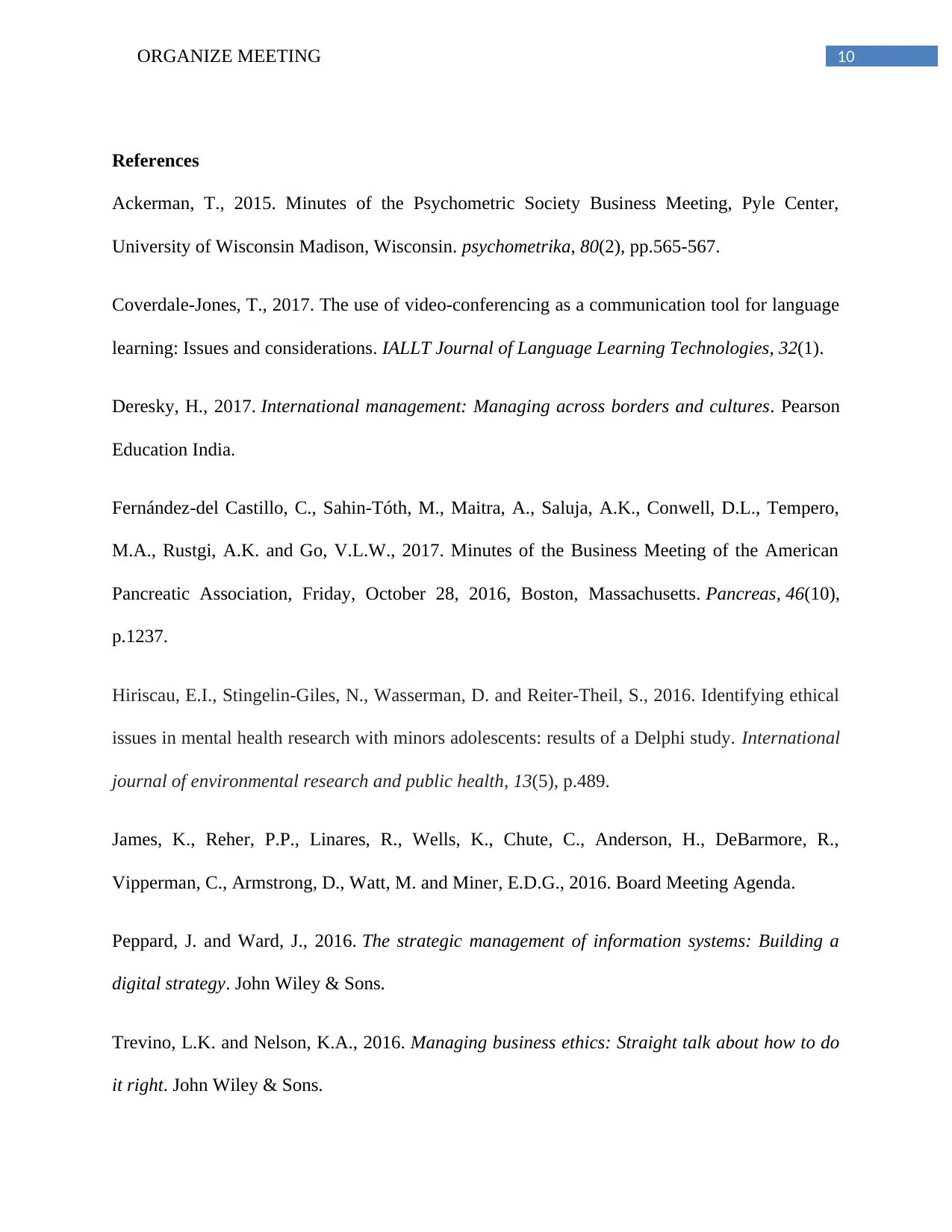
10ORGANIZE MEETING
References
Ackerman, T., 2015. Minutes of the Psychometric Society Business Meeting, Pyle Center,
University of Wisconsin Madison, Wisconsin. psychometrika, 80(2), pp.565-567.
Coverdale-Jones, T., 2017. The use of video-conferencing as a communication tool for language
learning: Issues and considerations. IALLT Journal of Language Learning Technologies, 32(1).
Deresky, H., 2017. International management: Managing across borders and cultures. Pearson
Education India.
Fernández-del Castillo, C., Sahin-Tóth, M., Maitra, A., Saluja, A.K., Conwell, D.L., Tempero,
M.A., Rustgi, A.K. and Go, V.L.W., 2017. Minutes of the Business Meeting of the American
Pancreatic Association, Friday, October 28, 2016, Boston, Massachusetts. Pancreas, 46(10),
p.1237.
Hiriscau, E.I., Stingelin-Giles, N., Wasserman, D. and Reiter-Theil, S., 2016. Identifying ethical
issues in mental health research with minors adolescents: results of a Delphi study. International
journal of environmental research and public health, 13(5), p.489.
James, K., Reher, P.P., Linares, R., Wells, K., Chute, C., Anderson, H., DeBarmore, R.,
Vipperman, C., Armstrong, D., Watt, M. and Miner, E.D.G., 2016. Board Meeting Agenda.
Peppard, J. and Ward, J., 2016. The strategic management of information systems: Building a
digital strategy. John Wiley & Sons.
Trevino, L.K. and Nelson, K.A., 2016. Managing business ethics: Straight talk about how to do
it right. John Wiley & Sons.
References
Ackerman, T., 2015. Minutes of the Psychometric Society Business Meeting, Pyle Center,
University of Wisconsin Madison, Wisconsin. psychometrika, 80(2), pp.565-567.
Coverdale-Jones, T., 2017. The use of video-conferencing as a communication tool for language
learning: Issues and considerations. IALLT Journal of Language Learning Technologies, 32(1).
Deresky, H., 2017. International management: Managing across borders and cultures. Pearson
Education India.
Fernández-del Castillo, C., Sahin-Tóth, M., Maitra, A., Saluja, A.K., Conwell, D.L., Tempero,
M.A., Rustgi, A.K. and Go, V.L.W., 2017. Minutes of the Business Meeting of the American
Pancreatic Association, Friday, October 28, 2016, Boston, Massachusetts. Pancreas, 46(10),
p.1237.
Hiriscau, E.I., Stingelin-Giles, N., Wasserman, D. and Reiter-Theil, S., 2016. Identifying ethical
issues in mental health research with minors adolescents: results of a Delphi study. International
journal of environmental research and public health, 13(5), p.489.
James, K., Reher, P.P., Linares, R., Wells, K., Chute, C., Anderson, H., DeBarmore, R.,
Vipperman, C., Armstrong, D., Watt, M. and Miner, E.D.G., 2016. Board Meeting Agenda.
Peppard, J. and Ward, J., 2016. The strategic management of information systems: Building a
digital strategy. John Wiley & Sons.
Trevino, L.K. and Nelson, K.A., 2016. Managing business ethics: Straight talk about how to do
it right. John Wiley & Sons.

11ORGANIZE MEETING
⊘ This is a preview!⊘
Do you want full access?
Subscribe today to unlock all pages.

Trusted by 1+ million students worldwide
1 out of 12
Related Documents
Your All-in-One AI-Powered Toolkit for Academic Success.
+13062052269
info@desklib.com
Available 24*7 on WhatsApp / Email
![[object Object]](/_next/static/media/star-bottom.7253800d.svg)
Unlock your academic potential
Copyright © 2020–2026 A2Z Services. All Rights Reserved. Developed and managed by ZUCOL.





